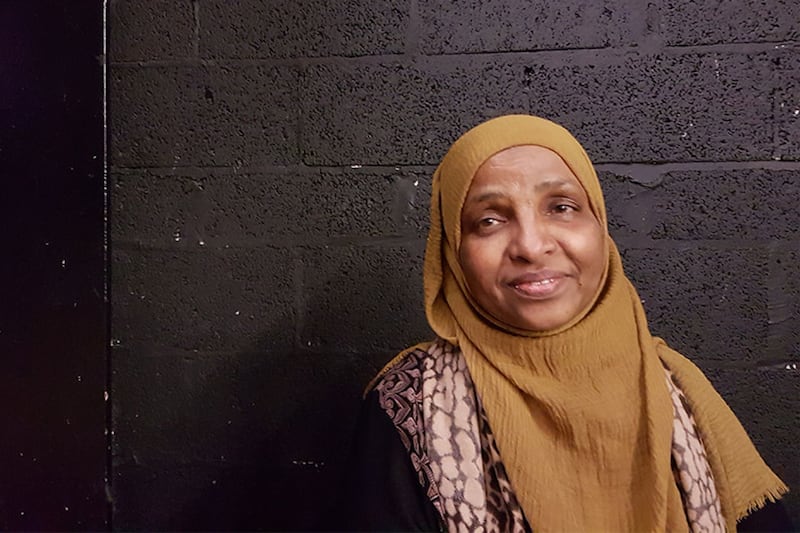"Why do you wear a head scarf? How does a woman from Hong Kong end up becoming a politician in Northern Ireland? How did you survive the asylum system for 14 years?"
In a dim room in Belfast arts centre The Black Box, dozens of people are sitting around small tables chatting one-on-one about race, religion and what it is to be human.
It looks like a form of speed dating, with each person given 20 minutes to speak to a 'living book' - everyone from survivors of the Troubles to asylum seekers and new and old immigrants to the north.
There's free tea and coffee and, more importantly, an impressive spread of buns.
An organiser rings a bell to signal the start of each session and again when the allotted time is up.
Some people can't bear to stop talking, others hug their 'book' or shake hands. One woman describes the experience as "overwhelming" and is on the verge of tears. "I really felt moved," she tells her book. "Thank you for talking to me."
The participants have been paired together for the 'Living Book' project, hosted by Belfast City Council's Good Relations Unit as part of the Imagine! festival.
The project has been running in Belfast for seven years. It seems a simple enough idea. But the people I spoke to - books and their readers - said that each person they encountered offered something new. They said they left that room in the city centre with a new appreciation of humanity - the struggles, challenges and joys we all face.
Here are some of their stories.
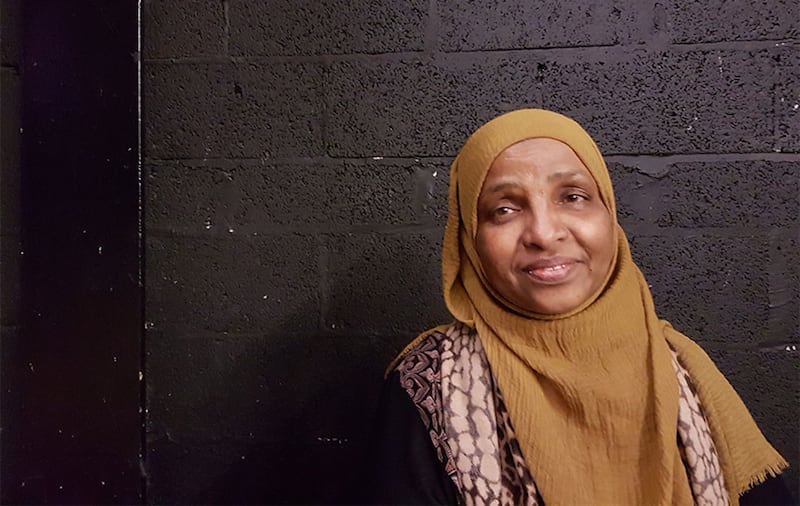
Maryama Yuusuf's story
A Somali mother of nine, she fled her country during the ongoing civil war which began almost three decades ago following the overthrow of Mohamed Siad Barre's military junta.
"I was born in Mogadishu. A war had been going on since 1991 which made people leave the country," she said.
"Somalis are still tribalist - we have a majority and a minority. I belong to the minority tribe.
"Just one day me and my family were separated because I left the house to get food. I was away for four hours... when I came back there was a war going (on) back in my area."
She hid in collapsed buildings until the fighting was suspended at sunset.
"When I came back to the house my family were not there - my mum, my children, my brothers, my sisters, my grandparents," she said.
"Only my disabled uncle was there. He has no legs and no wheelchair. He told them 'if I die, I die, just go'... He didn't know where they went to."
She stayed with her uncle for three days before she was captured by militia soldiers who spotted the smoke from her cooking fire.
"They took me to their place. I was their slave. I cooked and cleaned. (I was) beaten and raped," she said.
"After one month another militia attacked them, otherwise I would have been there forever or killed.
"Six of us - five ladies and one man - had a chance to run."
Maryama returned home and borrowed a neighbour's wheelbarrow to bring her uncle to safety. They eventually escaped to Ethiopia where they managed to contact her uncle's son in the US.
Her relative paid a large sum to an 'agent' who promised to help her seek asylum in the US. He took her to the British Embassy where she was fingerprinted and given a visa.
She and the agent later flew to Heathrow and then on to Dublin.
"I had no idea about anything and I wasn't allowed to ask him questions because he was afraid he might be caught," she said.
"I was afraid. I was sick and he gave me painkillers."
The agent took her to a hotel in Dublin and bought her some warm clothes - leggings and a jacket.
He later went to buy her shoes and "never came back". She said the agent took all her documents in case he was caught.
Maryama, who could not speak a single word of English at the time, was referred to gardaí by staff at the hotel.
"I did not know what garda was," she said.
"I could see it was army. I was afraid and shaking. I was afraid I was in trouble because I could see their weapons and everything they were wearing so I was in a state of shock. I collapsed and when I woke up I was in St James's Hospital."
She said hospital staff used a map to try and discover where she was from.
"I touched Somalia," she said.
"They called the Somali community in Britain who came and explained things to me. They said I'm not in any trouble, I'll be fine, the hospital will treat me well.
"I appreciate that's where I got well. I got all my medication.
"They said 'when the hospital discharges you, you have to seek asylum, you have to go to the Department of Justice'."
For seven years, she was housed in several refugee centres across the Republic, including Mosney in Co Meath. However, her application was rejected because she had no official documents which proved she was Somali.
"I was afraid to be sent back to Somalia," she said. "They located my family. They knew my family had come back from the refugee camp to Mogadishu so why did they deny my case?"
Maryama later travelled to Belfast and sought asylum in the UK. She was detained several times and passed through the north's refugee centre in Larne, as well as several in Britain.
"I became really depressed," she said. "I wanted to end this life. My family thought I was a criminal because they didn't understand detention."
She said she survived thanks to friends she made in the Somali community in Belfast and City Mission Church where she was studying English.
"I have friends who really take care of me," she said.
As an asylum seeker, Maryama was not allowed look for work but she has volunteered for several projects, including cooking in a centre for homeless people. She has also appeared in several community plays, including the Theatre of Witness which aims to give a voice to marginalised people.
"I call myself black Irish," she said. "I belong to this country. Ireland is my country... as a black Muslim woman, we are part of Northern Ireland society."
She said living in a shared room in asylum accommodation in Belfast has proved very difficult. But she now feels hopeful after her asylum application was approved a fortnight ago - 14 years after she fled Somalia.
"Last Monday my solicitor called me and he told me the Home Office had accepted my case," she said.
"Who knows what will come? Even though my family and I are separated and have grown up without me they are still with my mum.
"It is very, very hard to be in the asylum system. I would like to stay in Belfast and bring my family over so they can be educated and contribute to this society. I don't know if this will happen."
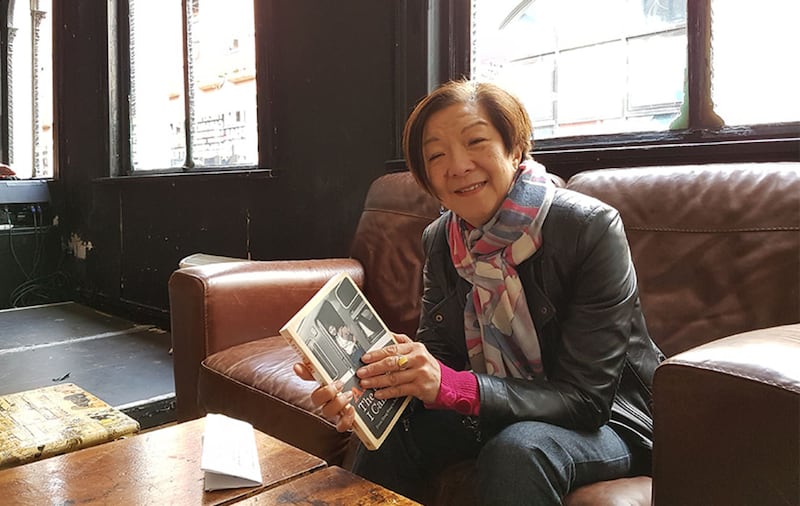
Anna Lo's story
Two taxi drivers asked me 'are you a Catholic Chinese or a Protestant Chinese?'
Hong Kong-born Anna (68) came to Northern Ireland in 1974 after marrying a journalist from Belfast. She arrived shortly after the Ulster Workers' Council strike, when sectarian violence was raging.
After decades working as a social worker and activist who lobbied for the Race Relations Act to be extended to the north, she made history in 2007 when she became the first Chinese-born person to be elected as a member of a legislative assembly in Europe. That feat has never been repeated.
The former Alliance MLA for South Belfast, who retired in 2016, said she had seen huge changes in the Chinese community since she came to Belfast.
"It was quite a small community when I arrived," she said.
"When the Troubles raged on, all the fast food companies wouldn't come to Northern Ireland... and foreigners wouldn't come to Northern Ireland but the Chinese continued to come through the sixties and the seventies.
"In the eighties they became the biggest ethnic community in Northern Ireland and really cornered the fast food market. By the late eighties, every town and city had a Chinese takeaway.
"I rememember once (former Irish president) Mary McAleese said in a Chinese New Year event 'if it hadn't been for the Chinese takeaway down the road from her home her children would have starved'. I think that was a very good compliment."
Anna said there was now greater acceptance towards the Chinese community.
"There seem to be more attacks (and) racist harassment against the Muslim community and they have kind of left the Chinese community alone," she said.
"(People think) they're one of us so we don't throw stones at them any more."
However, she said the north's sectarian divisions meant that some people were confused by her background.
"Two taxi drivers asked me 'are you a Catholic Chinese or a Protestant Chinese' and when I said to them 'well my parents were Daoists so I'm kind of Daoist' they said 'what's that'?" she said.
Anna has written an autobiography, 'The Place I Call Home', published by Belfast-based Blackstaff Press.
"I read a book Wild Swans which was about three generations of women going through very turbulent times in China and I thought 'well I kind of have a story to tell too'," she said.
"I knew at that time only snippets of my family background. In 2008 or 2009 when I went back to Hong Kong for a holiday I spoke to my mother's brother and he just told me loads and loads of things about my mother's side - really interesting stuff, murderers and crime and all sorts.
"I went home and wrote it up in English and sent it to my sons... They were fascinated. I had a multi-millionaire grandfather - the money all disappeared. One great-uncle, who himself was a doctor, died of heroin addiction, all sorts of stuff."
Anna said politics in the north remains complex and confusing for immigrants.
"If you're from outside you really don't feel you fit in to either side," she said. "A lot (of immigrants) are not Christian so they think 'okay which party should I vote for?'."
She became a politician in 2007 after years as an advocate for the Chinese community.
"There was an air of optimism at that time," she said. "Stormont had been suspended for several years and there was supposed to be a new atmosphere, more (focus) on bread and butter issues and less tribal politics. I just wanted to be part of that change.
"I have a rebellious streak. I wanted to test the attitudes of local people - would they support someone clearly not from here?"
Anna said her decision to stand for election sparked some "strange reactions".
"The Alliance Party got a call to say 'she's not from Northern Ireland, how dare she say she can represent South Belfast'," she said.
"There was another woman who said 'she needs to learn English, her English isn't good enough'.
"This woman talked to me directly, she wanted me to join her class Teaching English as a Foreign Language... I suppose I felt stung because she was so rude.
"I said 'I have a Masters degree and my lecturers never had any problem with my written or spoken English - what can you teach me?'.
"She slammed the phone down on me."
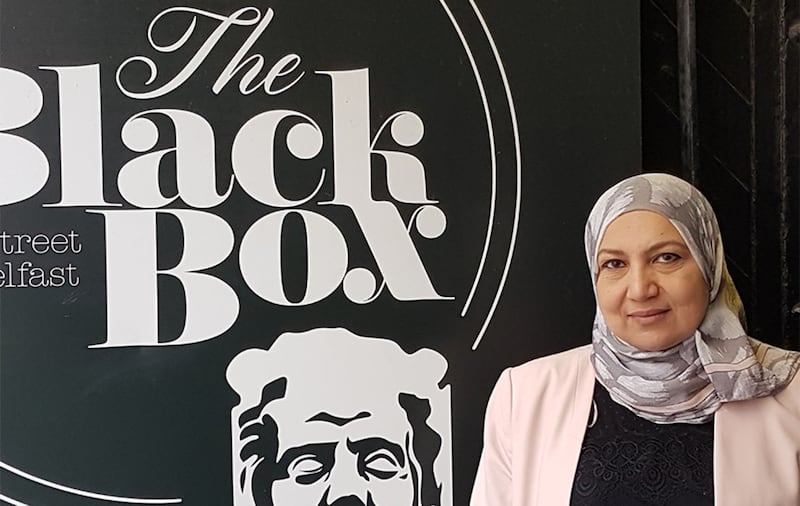
Taghreed Galal's story
"Someone asked me if we wear it (the headscarf) in the shower"
Egyptian-born Taghreed came to the north with her husband and three children in 2001. Her husband, a doctor, wanted to come to Northern Ireland to work.
They moved around several places, including Antrim and Derry, before finally settling in south Belfast.
Now a prominent member of Belfast Islamic Centre, the trained pharmacist said attitudes to the north's growing Muslim community have changed hugely since she first arrived.
"I was in a very small place when I came for the first time," she said.
"It was dark and raining, severe raining and always dark.
"They had never seen an Arab woman, they didn't know anything about Arab women. For them I was a very strange person. It was the worst days of my life. No one wanted to talk to me and I couldn't speak English or drive... They only started to speak to me in the last two months (I was there).
"After that I moved to Derry and the people there are very, very friendly. They are very family-minded."
Taghreed is from Port Said, a large city on the Suez canal around an hour-and-a-half from Cairo. During the early years of her marriage she and her husband lived in Saudi Arabia.
"I come from Saudi Arabia to Northern Ireland was completely different, a completely different culture," she said.
"I took time until I made a life here."
Taghreed said being a member of the Belfast Islamic Centre helped her settle in. She is now passionate about helping other Muslim women find their feet in the north.
"We try to do lots of activities for them," she said. "Especially people who come here with little English or who have a limited income."
Taghreed said she and her husband came to the north partly because they wanted their children to receive a good education.
Her eldest son is a doctor, her daughter is training to be a dentist and her youngest son is due to study law at university.
"My neighbours always ask about my children. If you look at us as a family we are very keen on education," she said.
She has been a part of the Living Book project since it was established and said she wanted to educate people about the Muslim community.
"I want to let people know - what is our culture, what is our Islam, what are our manners," she said.
"We have done lots of visiting and welcomed women's groups around Belfast. I think this is very, very important. People come to the Islamic Centre with one impression and they go out with a different impression."
Taghreed said the north's Muslim community is growing and has been boosted by the re-settlement of some Syrian refugees.
"It's normal now to see Muslim ladies walking in the street," she said.
"Before, if you were not in Belfast, if you were in other parts of Northern Ireland, you would see people looking at you. Some people are very nice and some people you find they are laughing at your face or talking (about you). We have faced some bad comments but day after day I think it's changing."
She said the Living Book project allowed people to ask her direct questions one-on-one.
"I encourage them to ask whatever questions they want," she said.
"Always people ask 'why do you wear a headscarf?'. Everyone thinks that we wear the scarf at home. Someone asked me if we wear it in the shower. I say 'we are like any other woman, just when I go out I cover myself'."
Taghreed said the Muslim community had faced scrutiny in the wake of terrorist attacks by so-called Islamic extremists.
"The problem is that when any terrorist attack happens the media always focus not on the person but his religion," she said.
She added: "This person, if he knew the meaning of Islam, he would never, ever hurt any person. Islam is peace and it is not allowed (for Muslims) to attack any innocent person... What we try to do is tell people 'Islam is peace'... We are all the same, we are all human."
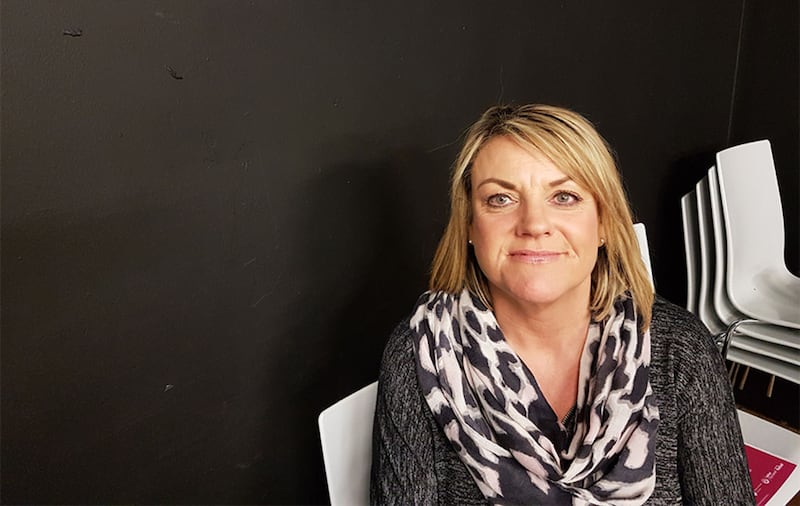
Louise Reilly
"Listening and looking at someone and hearing about their experiences - it's just overwhelming"
Louise, from Andersonstown in west Belfast, had never been a part of the Living Book project before but is already planning her next visit.
She spoke to several 'books' including Irish language activist Linda Ervine and was visibly moved while talking to Somali refugee Maryama Yuusuf.
Louise said she wanted to see what it would be like to borrow a 'human book' "because the concept, I think, is fantastic".
"I've spoken to Linda Ervine who is a real inspiration," she said. "I started off studying Irish years and years ago and then I dropped out of it. She has inspired me now to take it up again."
She said she gained a silver fáinne in 1997 and was keen to improve her language skills.
She added: "There were no barriers there at all... she might be from another denomination but there's no difference between us. We're all human, we all have the same worries. Talking to her and hearing how many people in the Protestant/Unionist community are interested in Irish is unreal... it's only through her that we get to hear things like that."
Louise said she was "blown away" by Maryama's strength and courage.
"If ever there was an inspirational woman that's her," she said.
"To see and speak to someone, it makes it real.
"Listening and looking at someone and hearing about their experiences - it's just overwhelming."
Louise said the experience was hugely positive.
"I'm definitely glad I came," she said.
"I'll go to the next one and I'll encourage other people to go to the next one. Everybody should do this. It's a really good way of connecting with people you'd never normally get to see or talk to. To just hear people's experiences - it really opens your eyes."




